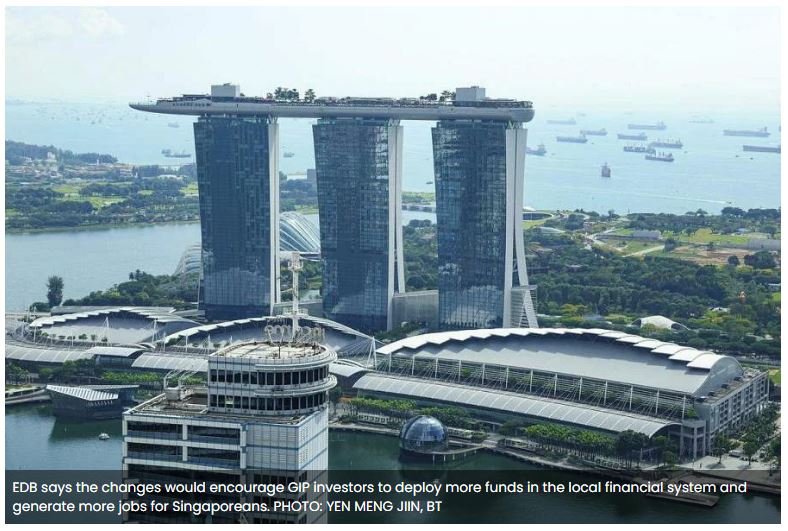Singapore raises minimum investment sums for ultra-rich seeking permanent resident status
INDIVIDUALS seeking permanent-resident (PR) status via Singapore’s Global Investor Programme (GIP) must soon invest more: at least S$10 million in a business or S$25 million in an approved fund. Those establishing family offices must deploy and maintain at least S$50 million in any of the four investment categories.
The changes take effect on Mar 15 for new applicants. The old requirements will continue to apply for existing GIP PRs and applications received before Mar 15.
With many jurisdictions “competing to attract high-calibre business owners and owners of capital”, the aim is to selectively appeal to those who can make a greater economic impact and “be more rooted to Singapore”, said the Singapore Economic Development Board (EDB).
Industry observers said the revisions are timely and will narrow the field to higher-quality applicants.
“What we want are individuals who can have an outsized impact,” said Lim Kexin, tax partner at PricewaterhouseCoopers. “In that respect, maybe we can filter out the lower-quality type of applicants.”
EDB gave the details on Thursday (Mar 2), after Minister for Trade and Industry Gan Kim Yong said on Tuesday that the existing S$2.5 million minimum for all three options would be raised.
The changes are part of EDB’s ongoing review to ensure the GIP is effective in “attracting only top-tier business owners who are interested to drive the growth of their businesses and investments from Singapore”.
The GIP accords PR status to eligible global investors, with three investment options. Each has additional requirements for such PRs to get their re-entry permit (REP) renewed after five years.
Option A is to invest in a new or existing business in Singapore. The new minimum investment is S$10 million, inclusive of existing paid-up capital.
Option B is to invest in a GIP-select fund, shortlisted by EDB, with a new minimum of S$25 million.
The current Option C is to invest S$2.5 million in a new or existing Singapore-based single family office with assets under management (AUM) of at least S$200 million – at least S$50 million of which must be held in Singapore.
From Mar 15, investors will instead have to establish a Singapore-based single family office with AUM of at least S$200 million, of which at least S$50 million must be deployed in any of the four categories, within 12 months of final approval.
The categories are: companies listed on licensed exchanges here; qualifying debt securities; funds distributed by Singapore-licensed managers; or private equity injection into non-listed Singapore-based businesses.
Currently, for all three options, the REP renewal condition is to hire at least 10 incremental employees – with at least five citizens – and have total business expenditure (TBE) of S$2 million by the fifth year of their PR status. For the family-office option, at least three of the hires must be investment professionals.
For Option A, the TBE requirement will be removed. Such investors must instead hire at least 30 employees, including at least 15 Singapore citizens. At least 10 must be incremental hires.
For Option B, both the TBE and hiring requirements will be removed. Instead, investors must have maintained their investment in the fund.
For Option C, the TBE requirement will be removed. The investor must maintain at least S$50 million in AUM, across any of the four categories, throughout the five-year period of PR status. They must hire at least five incremental family-office professionals, with at least three being citizens.
“The changes send a message as to the type of people that Singapore is looking to attract,” said Withers KhattarWong partner Stacy Choong. The new amounts are more suitable and “a calibrated measurement of what is regarded as meaningful for each investment option”, she added.
EDB said the changes will encourage GIP investors to deploy more funds in the local financial system and generate more jobs for Singaporeans, including in the finance, tax, legal, and fund-management fields.
From 2011 to 2022, GIP investments created 24,699 jobs, including roles such as software engineers, researchers and public-relations practitioners. Direct investments made by GIP investors resulted in over S$5.46 billion in TBE in that period.
The GIP was last revised in March 2020 with added eligibility categories. Between 2020 and 2022, some 200 people were accorded PR status under the programme.
Matthew Lee, senior vice-president of Contact Singapore at EDB, said: “Building on the success of the GIP to date, these changes will strengthen the support for our local startup ecosystem and create more good jobs for our people.”
Source: https://www.businesstimes.com.sg/singapore/singapore-raises-minimum-investment-sums-ultra-rich-seeking-permanent-resident-status


 English
English




